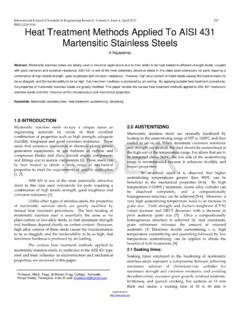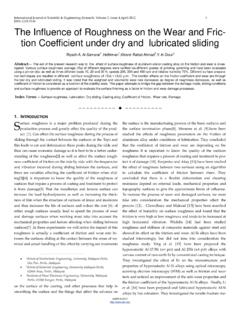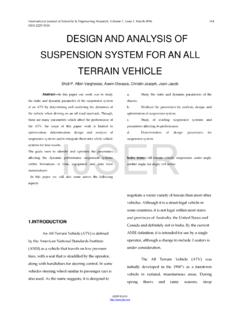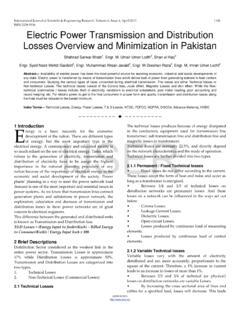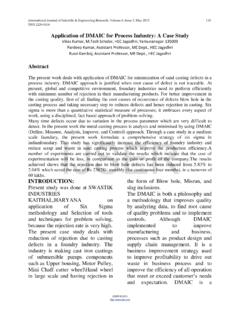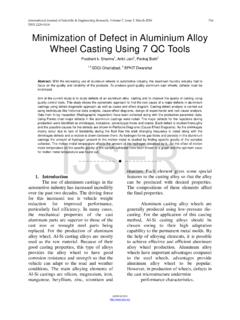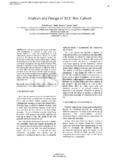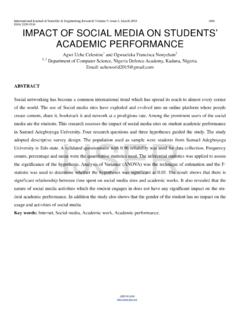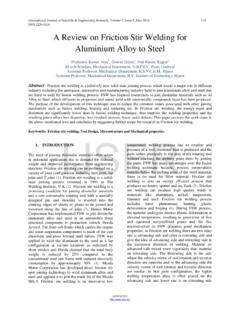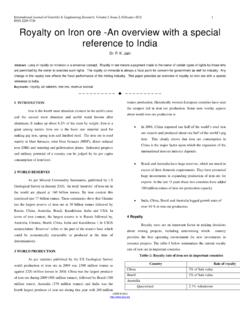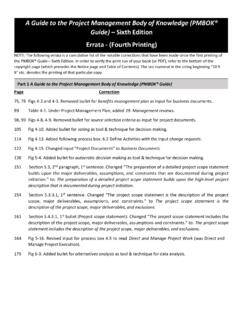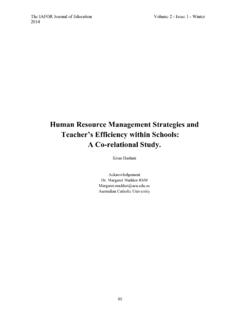Transcription of INDIGENOUS KNOWLEDGE OF MEDICINAL PLANTS USED …
1 International Journal of Scientific & Engineering Research, Volume 6, Issue 12, December-2015 159 ISSN 2229-5518 IJSER 2015 INDIGENOUS KNOWLEDGE OF MEDICINAL PLANTS used BY TRADITIONAL HEALERS IN ILOC0S SUR Germana Gloria V. Molina College of Arts and Sciences, University of Northern Philippines Germana Gloria V. Molina Email: Ma. Nina R. Eder Email: Vergilio Gascon Email: Abstract: This research documented local plant species with its botanical interest and scientific names used by the traditional healers in Iloc os Sur. In this study, the profile of the respondents who were Ilocano traditional healers were identified in terms of sex, age, serve as a healer, mentorship type of disease treated and specialization in the INDIGENOUS MEDICINAL treatment The INDIGENOUS KNOWLEDGE of the Ilocano traditional healers was studied based on the botanical remedies and human ailments of the identified plant species in Ilocos Sur.
2 It also included the methods of preparation of the MEDICINAL PLANTS used by the traditional healers. Fifty three (53) local traditional healers were interviewed to provide needed inf ormation. Based on the findings of the study the traditional healer in Iloc os Sur possesses rich ethnic pharmacological KNOWLEDGE . The study allows for identifying many high value MEDICINAL plant species, indicating high potential for economic development through sustainable collection of their medical plan. It also showed that the study area has plenty of MEDICINAL PLANTS to treat a wide spectrum of human ailments. Many people in the study areas of Iloc os Sur are still depending on MEDICINAL PLANTS , at least for the treatment of some simple diseases such as, cold, cough, fever, headache, poison bites, skin diseases and tooth infections.
3 It is necessary to acquire and preserve this traditional system of medicine by proper documentation and identification of traditional KNOWLEDGE on the INDIGENOUS uses of the MEDICINAL PLANTS could boost new innovations in the pharmaceutical industry and have many beneficial applications such as new MEDICINAL trials f or s ome dis eas es like: malaria, Tuberculosis and AIDS, of which will develop the health care sector in i loc os Sur. KNOWLEDGE sharing varied among the traditional healers. Some would freely share while others keep their techniques secret .Most of the healers do not follow rigid rules on dosage, but were practically strict to abstain or avoid some kind of food while their patients are under treatment. Many people in the study areas of Iloc os Sur are still depending on MEDICINAL PLANTS .
4 The traditional healers in Iloc os Sur possess rich ethnic pharmacological KNOWLEDGE on MEDICINAL plant. This allows the study for identifying many high value MEDICINAL plant species, indicating high potential for economic development through sustainable collection of thes e. Key words: INDIGENOUS KNOWLEDGE , traditional healers, MEDICINAL PLANTS ,Ilocos Sur Philippines ---------------------------------------- ---------------------------------------- ------------------------------------- INTRODUCTION Background of the Study INDIGENOUS KNOWLEDGE may be defined as KNOWLEDGE that is unique to a given culture or society which provide the infrastructure for agriculture, health care, food prep, training, environmental conservation and other life process on the local level (Tho mas, 1995).
5 Any local community may have continuous o ld KNOWLEDGE and traditional practices on MEDICINAL PLANTS as a mechanism for survival. INDIGENOUS KNOWLEDGE as a concept is baffling. Development institutions have not thus far gone to a unanimous perception of the concept. None of the definitions are essentially contradictory, but they overlap in many aspect. Warren ( 1991) and Flavier; (1995). INDIGENOUS KNOWLEDGE (IK) is the local KNOWLEDGE and is unique to a given IJSERI nternational Journal of Scientific & Engineering Research, Volume 6, Issue 12, December-2015 160 ISSN 2229-5518 IJSER 2015 culture or society. IK contrasts with the international KNOWLEDGE system generated by universities, research institutions and private firms.
6 It is the basis for local-level decision making in a host of human activities in rural communities. (Warren 1991). It is the information base for a society, which facilitates communication and decision-making. INDIGENOUS information systems are active, and are continually influenced by internal creativit y and experimentation as well as by contact with outside (Flavier 1995: 479) . In the emerging global KNOWLEDGE economy a country s ability to build and mobilize KNOWLEDGE capital, is equally essential for sustainable development as the availability of physical and financial capital (World Bank, 1997) The basic component of any country s KNOWLEDGE system is its INDIGENOUS KNOWLEDGE . It encompasses the skills, experiences and insights of people, applied to maintain or improve their living.
7 Significant contributions to global KNOWLEDGE have originated from INDIGENOUS people, , in medicine and veterinary medicine with their intimate understanding of their environments. INDIGENOUS KNOWLEDGE is developed and adapted continuously to gradually changing environments and passed down from generation to generation and closely interwoven with people s cultural values. INDIGENOUS KNOWLEDGE is also the social capital o f the poor, their main asset to invest in the struggle for survival, to produce food, to provide for shelter or to achieve control of their own lives. (Indian Journal of Traditional KNOWLEDGE , Vol. 10(2), April 2011, pp. 281-286 Today, many INDIGENOUS KNOWLEDGE systems are at risk of becoming extinct because of rapidly changing natural environments and fast pacing economic, political, and cultural changes on a global scale.)
8 Practices vanish, as they become inappropriate for new challenges or because they adapt too slowly. However, many practices disappear, only because of the intrusion of foreign technologies or development concepts that promise short-term gains or solutions to problems without being capable of sustaining them. The tragedy of the impending disappearance of INDIGENOUS KNOWLEDGE is most obvious to those who have developed it and make a living through it. But the implication for others can be detrimental as well, when skills, technologies, art facts, problem solving strategies and expertise are lost. INDIGENOUS KNOWLEDGE is part of the life of the rural poor; their livelihood depends almost entirely on specific skills and KNOWLEDGE essential for their survival.
9 Accordingly, for the development process, INDIGENOUS KNOWLEDGE is of particular relevance for the following sectors and strategies: agriculture, animal husbandry and ethnic veterinary medicine, use and management of natural resources, primary health care (PHC), preventive medicine and psychosocial care, saving and lending, community development, poverty alleviation. IJSERI nternational Journal of Scientific & Engineering Research, Volume 6, Issue 12, December-2015 161 ISSN 2229-5518 IJSER 2015 The rural communities depend heavily on plant diversity for the fulfilment of their basic needs and conservation of other natural resources. They collect useful plant resources from various habitats and utilize them using INDIGENOUS KNOWLEDGE and practices.
10 The vast store of information on INDIGENOUS KNOWLEDGE , practices, and technologies is being eroded as a result of fast urbanization, over-explo itation o f resources, unscientific land use, change of lifestyles and behaviour. Hence, priorit y ought to be given to document the useful PLANTS with INDIGENOUS KNOWLEDGE , practices as well as technologies from the area before the inhabitants shift over to modern lifestyle use to improve livelihoods, and their ro les in conservation and sustainable management of environmental resources have been carried out. There are still gaps in the comprehensive study and documentation relating to the ethno botanically useful species and INDIGENOUS KNOWLEDGE , practices and perception of the local people for sustainable resource management .
